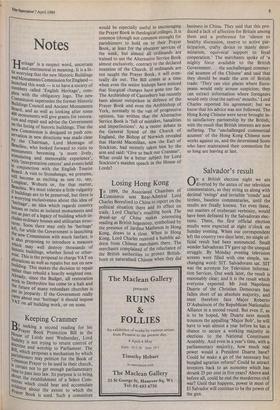Losing Hong Kong - in 1899, the Associated Chambers of 'Commerce
sent Rear-Admiral Lord Charles Beresford to China to report on the political situation there and its effect on trade. Lord Charles's resulting book The Break-up of China makes interesting reading as British hegemony, symbolised by the presence of Jardine Matheson in Hong Kong, draws to a close. When in Hong Kong, Lord Charles received a humble ad- dress from Chinese merchants there. The merchants complained of the reluctance of the British authorities to protect British- born or naturalised Chinese when they did
business in China. They said that this pro- duced a lack of affection for Britain among them and a preference for `silence to healthy discussion, reserve to active par- ticipation, crafty device to manly deter- mination, equivocal support to loyal cooperation.' The merchants spoke of `a mighty force available to the British Government... the unchallenged commer- cial acumen of the Chinese' and said that they should be made the arm of British trade: 'They can visit places where Euro- peans would only arouse suspicion; they can extract information where foreigners would only close the natives' mouths.' Lord Charles reported his agreement; but we know that his advice was not followed. The Hong Kong Chinese were never brought in- to satisfactory partnership by the British, with the result that British interests are now suffering. The 'unchallenged commercial acumen' of the Hong Kong Chinese now works against us, and the determined Scots who have maintained their connection for so long are leaving at last.










































 Previous page
Previous page